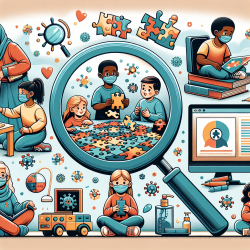The COVID-19 pandemic has significantly impacted children with Autism Spectrum Disorder (ASD) and their families. A recent qualitative study titled "A qualitative examination of the impact of the COVID-19 pandemic on children and adolescents with autism and their parents" provides critical insights into these effects and highlights strategies practitioners can implement to support this vulnerable population.
Key Findings of the Study
- Longing for Stability: Parents reported a strong need for stability and routine for their children with ASD, which was disrupted by the pandemic.
- Public Health Measures Yielding New Challenges and Unexpected Gains: While public health measures introduced new challenges, such as resistance to mask-wearing and decreased socialization opportunities, some parents noted unexpected gains, including improved adaptability and compassion in their children.
- Experiencing Abrupt Changes across Developmental Domains: Many children experienced regressions in social communication, self-care, and executive functioning, while others developed new independent living skills.
- Changing Family Dynamics: Families experienced both increased interconnectedness and strain from overexposure, highlighting the complex impact of the pandemic on family dynamics.
- Protective Factors: Continuity of educational and intervention supports, access to environmental resources, and adaptability were key protective factors that helped families cope.
Strategies for Practitioners
Based on these findings, practitioners can implement several strategies to support children with ASD and their families during pandemics or other emergencies:
- Promote Stability: Establishing consistent routines and structures can help mitigate the impact of disruptions. This can include regular schedules for online therapy sessions and structured daily activities.
- Utilize Hybrid Models: Combining in-person and remote therapy sessions can provide continuity of care and prepare children for potential future disruptions.
- Enhance Parent Training: Providing parents with training in effective educational and intervention strategies can empower them to support their children's development during emergencies.
- Leverage Technology: Ensuring families have access to reliable internet and technological resources can facilitate remote learning and therapy.
- Support Socialization: Encourage virtual social interactions to help maintain social communication skills and reduce feelings of isolation.
Encouraging Further Research
While this study provides valuable insights, further research is needed to understand the long-term impacts of the pandemic on children with ASD and to develop more effective support strategies. Practitioners are encouraged to contribute to this growing body of research by documenting their experiences and outcomes with various interventions.
Conclusion
The COVID-19 pandemic has underscored the need for flexible and resilient support systems for children with ASD. By implementing the strategies highlighted in this study, practitioners can better support these children and their families during times of crisis.
To read the original research paper, please follow this link: A qualitative examination of the impact of the COVID-19 pandemic on children and adolescents with autism and their parents.










